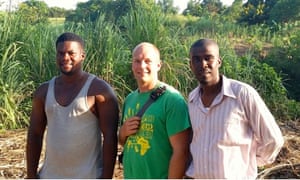
A former student of mine, Luke Hacker formed an organization called Simply Love, which works in Haiti to support educational and agricultural growth in the country. Through this group, I was introduced to an agricultural expert who relayed this personal story about environmental impacts on the island.
The story below is from Zacharie Bien-Aime, Agronomist, Local Technique Agent for the United Nations.
Since I was a child, I was taught that there are two rainy seasons. One extends from April to June and the other from October to November. As Haitian agriculture is dependent on rain for irrigation, farmers begin with soil preparation during the month of February to be ready to plant when the first rainfall begins in April.
For some time, I have observed changes in Haiti’s climate. Extreme weather conditions alternate between severe drought in the dry season and high rainfall during the wet season. In northwest Haiti where I work, we have just undergone four months of consecutive drought. Peasant plantations have lost most of their harvest because the crops cannot survive without rainfall. The rivers and natural water sources are dry resulting in a food crisis in the local communities.
For more than a month we have observed the presence of seaweed along the coast and experts claim that this is the consequence of climate change. The presence of this seaweed has serious repercussions for the fishing and tourist economy of these regions and also can present concerns to the health of the local population.

Elinx Brilliant and Luke Hacker, co-founders of Simply Love, and Zacharie Bien-Aime
All of this is the consequence of environmental degradation. The Haitian people don’t have access to other affordable energy resources so businesses and families use primarily charcoal. This has led to severe deforestation across the entire country. According to the records available in the archives of the Ministry of Environment, the vegetation coverage in Haiti is less than a 1.5% as of 2015.
In the agricultural sector of Haiti, climate change has caused a yield reduction of our principal crops of rice and maize. Also acceleration of soil erosion under heavy rain has led to a decrease in the fertility and productivity of the soil. Regarding water resources, climate change has increased the risk of flooding and prolonged drought. Longer periods of droughts cause an increase in food insecurity and many other conflicts where consistent use of water is needed.
Given these obvious impacts to agricultural resources and natural water resources, it is important to make the issue of climate change a national priority to be included in the political agenda of policy makers and NGOs in Haiti.Climate change is no longer a myth; it is a reality that we will have to deal with for many decades.
Posted by John Abraham on Friday, 18 December, 2015
 |
The Skeptical Science website by Skeptical Science is licensed under a Creative Commons Attribution 3.0 Unported License. |